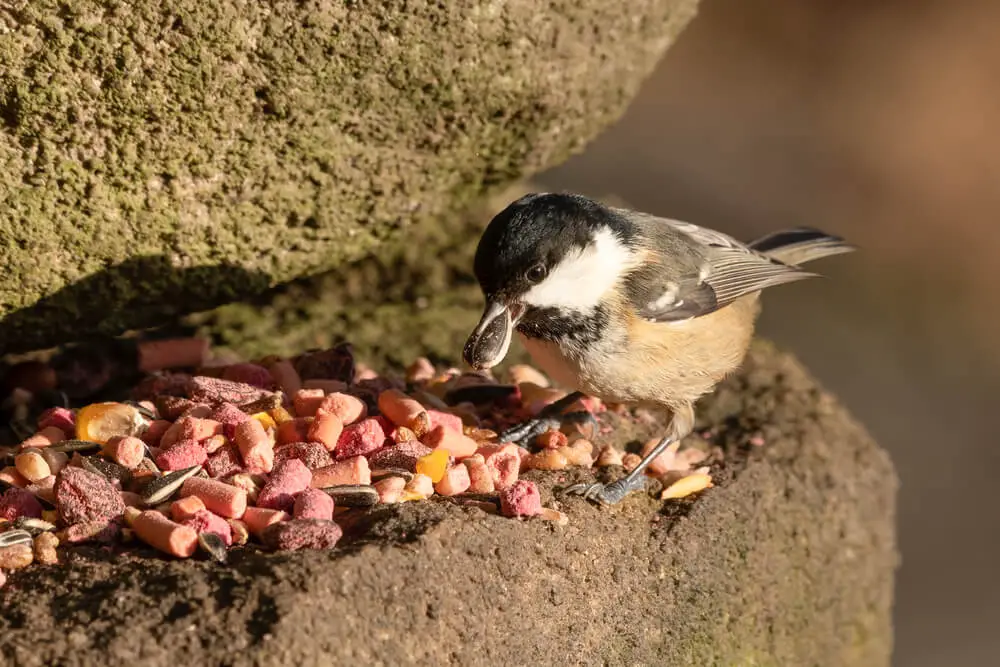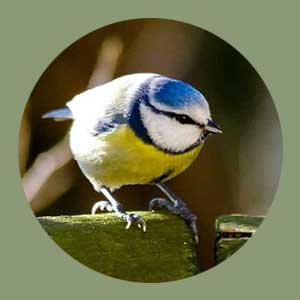It is a common misconception that birds only need supplementary food during winter when the weather and temperatures prevent them from foraging in the wild.
Summer is an equally busy time; there are millions of babies to feed, parent birds need as much help as they can get.
Nature’s store cupboards are often well-stocked in spring and summer; new buds, seeds, berries, and insects are rife. But, that doesn’t mean that songbirds won’t seek extra treats and nutritions from nearby feeding tables.
The food that birds eat in summer is very similar to what we’d put out in winter. They need to get as much energy onboard to raise a family and build strength for the autumn and winter.
Small, high-energy snacks such as fruit, peanuts, sunflower seeds, and cake crumbs are perfect treats; the only no-no is suet as it tends to go off quickly in the heat.
Table of Contents
The best foods to feed the birds in summer
As summer approaches, remember that many adults have babies to feed. It is a good idea to chop treats up into smaller pieces to prevent choking hazards.
Sunflower Hearts
The white heart at the centre of sunflower seeds is a win/win snack. The birds don’t need to struggle to break into the shell; leaving the garden is left mess-free.
They are easy to eat and packed full of energy.
Peanuts
Peanuts are rich in natural fats and favoured by sparrows, tits, nuthatches, woodpeckers, robins, and greenfinches.
I prefer to offer my birds crushed nuts; there is less chance of a hatchling choking.
Please don’t hang peanuts in the red netting bags they often come in; small birds can trap their claws and struggle to get themselves free.
Some peanuts contain Aflatoxin – it is poisonous to birds. Always check the back of the packaging to ensure they have been tested.
Don’t forget to leave some on the floor for the ground feeding birds.
Fruit
Birds love fruit, especially apples and pears that have begun to go soft. Either left on the ground or hung from a tree, fruit provides birds with much-needed vitamins and an energy boost.
Peaches, plums, apricots, and cherries are tasty alternatives but need to have the pits removed. While doing so, thread chunks of these and other fruit onto strings and suspend them from tree branches.
These hanging fruit kebabs brighten up any garden and attract a wide variety of birds.
Leftovers
Cooked rice and pasta are packed with carbohydrates and slow-releasing energy. Cheese, porridge oats, cake, and cookie crumbs provide an occasional sweet treat for tired birds.
Mealworms
Dried or live mealworms are readily available from pet stores and are enjoyed by many birds; robins, blackbirds, and tits are especially keen.
Although live mealworms are a little more expensive, they have far more nutritional value.
There is no need to chop them smaller; the adult birds easily devour them and often offer their young small regurgitated bits.

Why we need to feed birds in the summer
You might think that natural food is in abundance in spring and summer; usually, it is. However, British summers aren’t always predictable.
In the rare event of a heatwave and a long, hot summer, the ground becomes hardened, and earthworms burrow deep.
During wet summers, foraging for food becomes difficult.
Garden bird tables are a huge contributing factor in encouraging the population growth of many species of songbird.
Foods to avoid giving the birds in summer
High energy food is the key to feeding birds in summer; although suet falls into this category, it isn’t an advisable snack when temperatures rise.
Not only does the fat turn rancid quicker in the heat, but if the oil gets onto the bird’s feathers it will affect its ability to preen and, in turn, fly.
Small amounts of bread are better than nothing, but it has little nutritional value. It bloats the bird’s stomach, giving them a false sense of feeling full.
Porridge oats are a much better option.
Give the birds a drink in summer.
Remember to keep drinking bowls and birdbaths full during summer; heat evaporates the water quickly.
Although birds don’t need to drink often (usually only twice a day), they may need to quench their thirst more on hot days.
Final thoughts
Thanks for taking the time to read ‘What food do birds eat in summer’, as, with most diets, everything in moderation is fine.
Feed the birds little and often, always remembering to remove anything left uneaten before it has the chance to spoil and spread disease.
